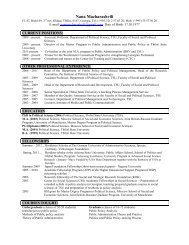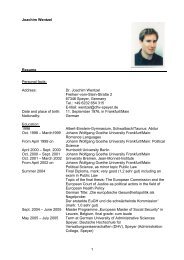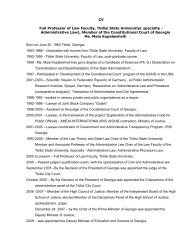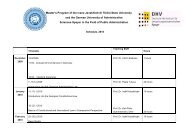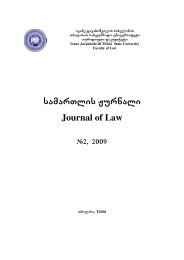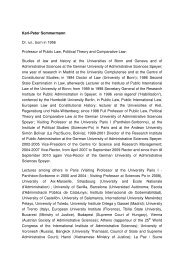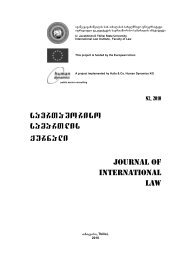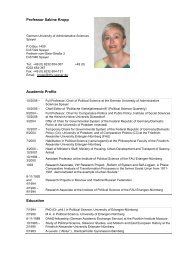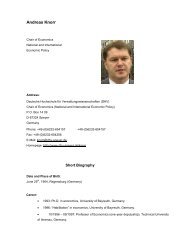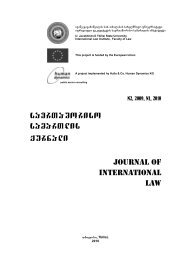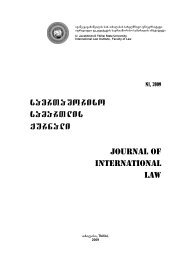Untitled
Untitled
Untitled
You also want an ePaper? Increase the reach of your titles
YUMPU automatically turns print PDFs into web optimized ePapers that Google loves.
E. SICHINAVA, “A REASONABLE TIME” REQUIREMENT<br />
the taking of several expert opinions and scientific<br />
research. Furthermore, in the course<br />
of the proceedings at issue the applicant altered<br />
his request for authorisation of the medicament<br />
at issue several times, which made<br />
it necessary to conduct further research. The<br />
Court considered that, due to the above mentioned<br />
reasons, the case was of considerable<br />
complexity. Despite this, the Court held that<br />
there has been a violation of Article 6(1). 40<br />
In the vast majority of cases there is an issue<br />
emerging which requires the expert opinion.<br />
Therefore, if all the cases of this kind are<br />
considered complex and this is referred to by a<br />
State, as a justifying circumstance, this will contribute<br />
to establishing erroneous practice.<br />
The requirements towards the state institutions<br />
shall be especially strict when the problem<br />
was known to a State beforehand and it<br />
had time for preparation.<br />
In the case Vallee v. France in which the<br />
applicant claimed compensation from the Ministry<br />
for Solidarity, Health and Social Protection<br />
did not agree with the submission of the<br />
Government that the case was complex, despite<br />
the fact that paying the compensation<br />
was related with certain intricacy. According<br />
to the Court’s position, “such problems had<br />
been foreseeable and therefore a solution<br />
could probably have been found earlier”. 41<br />
In order to justify their position in some<br />
cases the states refer to the circumstances<br />
such as the non-appearance of the participants<br />
of the proceedings in court, which according<br />
to their explanations, is the reason for<br />
making the case complex.<br />
In the case Konig v. Germany the Court<br />
noted that “the Government could not prove<br />
that the case contained the factual or the legal<br />
complexity. However, it is true that the 4th<br />
Chamber of the Administrative Court encountered<br />
great difficulties in tracing witnesses<br />
several of whom had in the meantime changed<br />
name or address”. 42<br />
In the case Guincho v. Portugal the Government<br />
was claiming that the case was complex<br />
due to the failure of witnesses and lawyers<br />
to appear in the court. The Court did not<br />
agree with the latter view: the circumstances<br />
adverted to by the Government did not complicate<br />
the conduct of the proceedings in a<br />
manner unusual for such litigation. 43<br />
We regard the arguments such as the<br />
courts may be unsuccessful in cases the witnesses<br />
do not appear in a court is not sufficient<br />
for considering the case as a whole to<br />
be complex. Some other components shall<br />
also be present therein.<br />
It is also interesting to consider how the<br />
acts of the charged person may resemble on<br />
the complexity of the case:<br />
In the case Ferrantelli and Santangelo v.<br />
Italy the Government conceded that the total<br />
duration of the proceedings might at first sight<br />
appear excessive, but justified it among others<br />
on the basis of the undeniably complex<br />
nature of the investigation because of the<br />
statements and confessions made and then<br />
retracted by the accused. According to the<br />
applicant’s position, the change of the testimony<br />
of the accused could not have been<br />
considered as the circumstance complicating<br />
the case, due to the fact that the accused is<br />
not obliged to cooperate with the investigation.<br />
The Court in fact agreed with the Government’s<br />
submission that the case was undoubtedly<br />
complex, but not due to these circumstances.<br />
The Court has not taken this argument<br />
into consideration. 44<br />
In the case Zmalinski v. Poland the Government<br />
were of the view that the case had<br />
been complex. According to the applicant modifications<br />
of his claims had not complicated it.<br />
The Court considers that, even though the<br />
case was of some complexity, it cannot be said<br />
that this in itself justified the entire length of<br />
the proceedings. 45<br />
We consider that a charged person is not<br />
obliged to cooperate with the investigation. As<br />
regards the plaintiff, the latter employs the procedural<br />
rights when broadening or specifying the<br />
claim. This is not out of the ordinary for court<br />
practice. Correspondingly, referring to these factors,<br />
as justifying circumstances, shall be employed<br />
by a State only in extremely exceptional<br />
circumstances, when this involves unpredictable<br />
and substantial complications.<br />
2. CONDUCT OF AN APPLICANT<br />
“State is only responsible for the violations<br />
which can be attributable to it. If the parties<br />
during the proceedings or the accused in a<br />
criminal case caused or contributed to protraction<br />
of the proceedings, this time-period<br />
shall not be taken into consideration”. 46<br />
For instance, in the case Proszac v. Poland<br />
the Court noted that the applicant con-<br />
119



